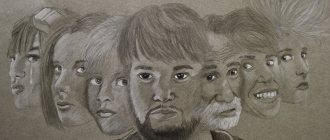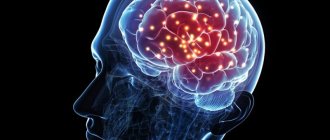Emotional personality disorder includes a whole complex of disorders, which is characterized by excitability, irritability, and a tendency to commit socially dangerous acts. This disorder is accompanied by frequent mood swings and the inability to control one’s actions.
People who have emotionally unstable personality disorder may commit violence. They are characterized by sudden manifestations of anger and loss of self-control. In this state, they are capable of committing rude acts that are contrary to the norms and principles of society. These patients pose a danger to the people around them and to themselves, so these people need to be treated.
There are 2 types of emotionally unstable personality disorder:
- impulsive:
- borderline.
Each of these types of disorder is characterized by corresponding symptoms.
Mental problems do not arise on their own or spontaneously. This is usually facilitated by genetic predisposition and characteristics of parental education of children.
Most often, personality disorders are observed in people who have close relatives suffering from the same disorders.
Mental disorders are often observed in children who have been subjected to cruel and strict upbringing measures, mainly from the father, as well as violence and abuse.
According to experts, females suffer from mental disorders more often than males.
Psychological developmental disorders
These pathologies in ICD-10 are included in the heading F80-F89. The diseases included in it always begin in childhood, including infancy. Their development requires a delay in the development of the nervous system or its damage associated with pathological maturation. They are characterized by a constant course, there are no relapses.
The lesions affect motor functions, speech, and visual-spatial skills. In most cases, environmental factors in this pathology are important, but not decisive. At the same time, the etiology of the lesion is not precisely defined, due to which an exact determination of the causes of developmental disorders cannot be established at the moment. Today it is also common to include autistic disorders among such pathologies.
Psychological disorders treatment
Treatment of psychological disorders in patients of any age can only be prescribed by an experienced specialist. Previously, the patient undergoes a thorough health examination. It is carried out in order to exclude the possibility of the presence of a physiological disease. Passing symptoms can be provoked, for example, by endocrine or neurological disorders.
After eliminating physiological causes, the patient's psychological state is examined. An important part is collecting a family history. The fact of hereditary damage to psychological diseases has not been confirmed at the moment, but there are cases of familial predisposition. Doctors suggest that they may be associated with family habits and hereditary character traits.
The following are used in therapy:
- medications: antipsychotics, antidepressants, mood stabilizers;
- psychological classes, both individual and in groups;
- Physical therapy classes are shown.
Often patients may be advised to find an additional hobby. It can distract the patient from unpleasant thoughts.
Example (PRL)
A young man meets a girl who is outwardly attractive and interesting to talk to. However, many oddities soon appear in her behavior. Almost every day she sends SMS in which she writes to her boyfriend about the need to break up. There seems to be nothing strange about this. But calls for separation are replaced by declarations of love. Insults - praise. There are typical signs of borderline personality disorder.
This disease requires treatment. It is worth saying that “border guards” sometimes manage to start a family. But over time, their loved ones may need the help of a psychologist. Being in an unstable relationship that combines love and hate in a bizarre way is not good for anyone.
Psychological personality disorders
After confirmation of the diagnosis, pathology refers to severe psychological deviations in the psychological sphere of a person’s consciousness. They are found in human popularity and are diagnosed in about 12% of the population. Disorders are more often diagnosed in males.
They are characterized by obvious violations of destructive behavior patterns. This list does not include personality disorders caused by pathologies or brain injuries.
According to ICD10, psychological disorders are divided into:
- Schizoid, characterized primarily by disturbances of contact in society, a tendency to recluse and complete isolation. Patients lack a proper sense of reality. A schizoid can be continuously busy with endless and meaningless mental work.
- Paranoid disorders accompanied by an increased level of suspicion. Patients are characterized by increased sensitivity, high ambition, and inability to accept personal failures. Over time, the severity of the reaction does not dull, but appears regularly with increasing force.
- Dissocial, characterized by a disdainful attitude towards social, personal, and everyday responsibilities.
- Emotionally unstable, in which instincts and feelings become the determining reasons for actions.
- Hysterical, in which patients are characterized by dramatization of what is happening, excessive pretense in the manifestation of feelings.
- Anankastnye, a striking feature of which is pedantry at the level of pathology. Petty scrupulousness contradicts a real love of order.
- Anxious, which is accompanied by a constant feeling of fear and personal tension. A person constantly assumes that something tragic might happen to him. Accompanied in most cases by an inferiority complex.
- Dependents, characterized by a personality’s tendency to completely subordinate to others, pathological passivity, and the inability to make adequate decisions independently.
According to ICD 10, “other disorders” include narcissism, eccentricity, infantilism, psychoneurotic and passive-aggressive disorders. Doctors also separately identify pathologies of an unspecified type.
Symptoms
What are the manifestations of a personality disorder? Can we name the symptoms of paranoia and hysteria? Psychiatry is one of the nebulous areas of medicine. This conclusion can be reached based on all of the above. But still, criteria for personality disorder exist. Psychiatrists revealed the following:
- Unproductive mental effort.
- Alienation from society.
- Inappropriate emotional reactions to the outside world.
- Gap with objective reality.
- Inability to adequately assess one's own uniqueness.
- Inability to maintain close relationships.
Causes of psychological disorders
The list of provoking factors may include:
- severe pregnancy in the patient’s mother;
- birth injuries;
- presence of genetic predisposition;
- severe stressful situations;
- experiences, including in childhood, of psychological or physical violence.
The presence of one or even several provoking factors at once does not guarantee the onset of a psychological disorder.
In such patients, disturbances are caused by the characterological constitution, the habitual model of behavior used, and a certain personal structure.
Overestimating your own abilities
As for the inability to realize one’s own uniqueness, this feature as a criterion for a mental disorder, of course, can also raise doubts. Every person is unique. Nobody wants to be part of the gray mass. Still, it is difficult to lead a full life for a person who does not separate his own feelings, thoughts and desires from the feelings, thoughts and desires of other people.
One of the types of mental disorders is graphomania. Man creates works of no value. But he is not interested in the opinions of professionals. He is convinced of his genius, and this confidence will not be destroyed by outside opinion.
Not every person manages to create a happy family. The inability to maintain close relationships does not mean madness. However, the human psyche has an inherent need for affection. Not necessarily to family. These could be friends, a loved one, or even a pet. Therefore, a violation of the natural psychological mechanism also includes attachment disorder.
Symptoms and signs of psychological disorder
At the moment, doctors are not ready to strictly define the specific symptoms and signs of a psychological personality disorder. Manifestations in each patient are strictly individual. But there are general points that suggest the need to seek advice.
According to ICD10, the main symptoms and signs include disturbances in behavioral reactions, mental activity, and actions that go beyond the recognized framework of current cultural and moral beliefs and norms. Physical, cognitive and neurological symptoms are observed. They are prone to increased levels of fatigue. They often feel excessively happy or excessively unhappy without a specific reason. Logical relationships are broken.
ICD10 calls the signs:
- spatiotemporal disorientation;
- quick and groundless changes in mood;
- inadequate attitude towards one’s own physical and emotional state;
- the appearance of hallucinations;
- cases of confusion;
- confusion;
- fright;
- lack of reaction to what is happening.
Sleep is often disturbed. This can equally manifest itself as increased levels of drowsiness and insomnia. A common trigger is depression associated with serious stress, for example, the loss of a close relative. There may be a violation of the order of self-identification. The patient creates an alternative personality that has nothing to do with what happened. The weakening of memory to the level of its complete absence is diagnosed. Mental interest is disturbed, often accompanied by delirium. In some cases, the patient suffers from bouts of unreasonable laughter or a tendency to unreasonably increased tearfulness. Doctors include alcohol and drug abuse among psychological disorders.
Signs characteristic only of men are highlighted separately. They may be associated with untidiness in appearance and violation of hygiene standards. Men experience failures especially painfully and tend to blame the entire world around them for what happened. They become irritable and tend to offend and humiliate their interlocutors.
From normal to pathological
According to statistics from the World Health Organization, 27% of people in the world have suffered from one type of personality disorder at some time. Perhaps one of your friends is among this number. But it's unlikely that you'll be able to guess who it is. A mental disorder can affect an office manager, a teacher, or the director of a large company. Anyone. And this illness does not always result in an inappropriate form of behavior.
There is no clear, universal scale of normality. After all, the human psyche is not static. A healthy person can be overwhelmed with optimism, become despondent, show impatience, and express irritation. The norm is a dynamic balance, but not a definite mark. You cannot label a person with a percentage of normality. Yesterday's patient in a psychiatric hospital can be cured of his illness today. And in the behavior of a previously adequate person, personality disorders may suddenly appear.
Psychiatry is a relatively young science. Personality disorders are not fully understood. A person can lead a completely normal life most of the time. From time to time, exacerbations occur that are not the reason for registration. In medicine this is called a borderline state. In addition, as a result of successful treatment, and sometimes just like that, remission occurs.
It is noteworthy that Plato called love a serious mental illness. Modern researchers partly agree with the opinion of the ancient philosopher. True, here we are talking not about love, but about falling in love. Scientists have found that in this condition, some parts of the brain are activated in the same way as in obsessive-compulsive disorder.
Richard Bentall went further. A professor from the University of Liverpool in one of his articles called the feeling of happiness a mental disorder. He endowed a state in which a person is completely satisfied with everything that happens around him, “a major affective disorder of a pleasant type.”
Of course, the doctor did not mean that happy people should be sent for compulsory treatment. But his point of view is very important for understanding that not all deviations from the so-called norm should be considered madness. Indicators of mental disorder should only include things that cause harm to a person and those around him.
Diagnosis of psychological disorders
When diagnosing psychological disorders, doctors must first prescribe an examination of all body systems. This is necessary to exclude physiological causes of pathology.
Patients are prescribed ECHO, MRI, CT, and examination by an endocrinologist and neurologist is recommended. A study of the medical history is carried out. Psychological manifestations often become side effects of taking certain medications. For example, prescribed in the treatment of neurological diagnoses.
An important part of the diagnosis is a personal conversation with the patient. It is recommended to involve close relatives and those people with whom the patient is in constant contact.
Antidepressants
People with personality disorders are reluctant to see psychiatrists. Depression is one of the few mental illnesses that most people can admit to having. Probably the whole point is that the name of this disease does not sound as unattractive as, for example, “paranoia”. However, most people are not easily persuaded to take medications. Not everyone agrees that some kind of chemistry can correct subtle matters of mental well-being.
There are several myths about antidepressants. One of them says that this medicine is a kind of happiness pill. Once you start taking it, you will become a blissful “vegetable”.
In the early nineties, antidepressants with minor side effects appeared on the world market. Their common name is SSRI. They are still the gold standard in the treatment of personality disorders. In psychiatry, however, the disadvantages of such antidepressants have been identified. Like all similar drugs, SSRIs have a cumulative effect. The mood of patients improves only after three weeks of using the medicine. During the first two weeks, will and energy appear. However, the mood is still bad.
Types of psychological disorders
In modern medicine, there are several main types of psychological disorders, which differ in symptoms and types of manifestation. Often, to eliminate the disease or enter a state of stable remission, depending on the type, different treatment options are required.
Neuropsychological disorder
Differs in manifestations of destructive behavior. In most cases, it is caused by improper functioning of the brain. Stand out:
- Exogenous or external causes associated with head injuries, illnesses, chemical poisoning, psychological trauma. May be associated with disorders of the cardiovascular system, leading to impaired blood supply to the brain.
- Endogenous or internal causes, which are mostly genetic, caused by a violation in the set of chromosomes.
Due to the commonality of psychotypes, they can often be transmitted from parents to children. Among the provoking factors are some diseases, including cerebral vascular sclerosis, diabetes mellitus, cerebrovascular accidents, and infectious diagnoses. Can be triggered by taking drugs and alcohol.
Mixed developmental disorders
In ICD13 they are classified as F83. The first manifestation is most often noted in childhood or infancy. Typically associated with chromosomal or genetic disorders. Accompanied by speech and school skills impairments. Motor functions may be impaired. They are diagnosed only in the case of a complete combination of several psychological disorders aggravated by life circumstances.
Specific psychological development disorder
Today, this category of pathological disorders has been poorly studied. An accurate diagnosis is complicated by the unreasonable combination of violations of the proper and timely acquisition of language skills, accompanied by motor disorders. But it is not recognized as intellectual retardation as such.
Mixed specific psychological development disorders
They are also established in the case of a combination of several factors recognized in the ICD10. Verbal intelligence suffers, and there are disturbances in the development of speech functions. There may be cases of disorientation and problems with logic are identified. Memory suffers.
Psychological development disorder in a child
They are diagnosed when a child has a combination of impairments in school skills, poor speech development, and problems with motor functions. In this case, it is impossible to establish an accurate diagnosis due to the lack of predominance of one of these disorders.
Additionally, a certain level of cognitive impairment is detected. The disadvantage of diagnosis is the frequent use of diagnosis in the absence of a real opportunity to establish the exact cause and the leading predominant factor. Often such children are diagnosed with mental retardation. An important condition is the identification of the first signs of pathology at a very early, often infancy, age.
The leading causes are called biological factors. Including minor tissue damage to brain structures, which provoked a disruption in the formation of interanalyzer connections.
An additional provocateur is the lack of information associated with the low family level. Manifestations include:
- speech disorder dyslexia;
- dysgraphia, which manifests itself in the occurrence of problems with the development of written speech skills;
- dyscalculation disorders.
Such children should be under constant supervision of a psychiatrist. The course of treatment includes psychotherapy sessions and drug therapy. It is difficult for children to master the curriculum of a secondary school. They successfully master the rules of acquiring school skills in Type VIII schools. Although such a translation is recommended only in situations where the level of pathology is on the same level as mental retardation.
There is a clear trend towards a decrease in the level of impairments in adolescence; often the pathology can eventually be smoothed out completely, but problems with cognitive efficiency can remain in adulthood.
Major psychological disorders
Currently, experts suggest that by 2020, psychological disorders may take fifth place in the list of diseases leading to disability. According to Russian doctors, pathologies can be diagnosed in at least every resident of modern Russia. Approximately similar levels of indicators are observed in all developed countries of the world.
All the reasons for the occurrence of such pathologies are not known to modern doctors today. Conducted research shows that the list of provocateurs may equally include genetic predisposition and external life events. Diseases of the nervous system, leading to psychological pathologies, are caused by all factors that disrupt the activity of the central nervous system.
Despite the inability to identify the exact cause of the onset of psychological disorders, these pathologies can now be successfully treated. Depending on the degree of damage, treatment uses only courses of psychotherapy or medications, including antipsychotics and antidepressants.
Currently, psychiatrists are highlighting an increase in the number of confirmations of diagnoses of depressive disorders and phobias. They can often be accompanied by bipolar disorder.
The danger of each of these diagnoses is a violation of the patient’s socialization. Even a violation at the mildest level leads to a decrease in the level of performance. Patients become socially isolated. They often prefer loneliness and family ties are disrupted. Pathology leads to the appearance of suicidal thoughts.
Another large group is fears. They are established whenever a level of panic is detected in the perception of objects, natural phenomena, or events. Modern man often becomes pathologically afraid of spiders, the dark, water, and some animals. The reason can actually be any factor. Moreover, in such a situation, fear is not caused by a natural sense of self-preservation. It is inexplicable and appears unreasonably. The concern is that in reality there is no threat to health, much less life.
The number of diseases associated with unreasonable feelings of fear is incredibly large. Many of us also encounter their manifestations during rush hour in a subway car or in a large chain store. The crowds of people that surround us here are unpleasant even for healthy people. But it is not rejection that speaks of pathology, but rather fear at the level of a panic attack, in which the patient may begin to choke and may faint.
The list of major pathological disorders includes alcohol and drug addiction, bulimia, anorexia, and obesity. Doctors often encounter pathological sleep disorders.
Dementor's Kiss
Using the names of the creatures that live in the popular book "Harry Potter", you can give a brief but clear description of one of the most common diseases of our time, namely depression.
The world suddenly became dim. And minor troubles lead to the fact that a person gives up, he suddenly becomes whiny, being by no means melancholic by nature. Life energy seemed to have left him. He does not want to strive for something, there is no desire to comprehend something new. And even more so to deal with troubles, the number of which is growing every day. These are all nothing more than signs of depressive personality disorder. This is not a temporary blues caused by bad weather, nostalgia or philosophical reflections. This is a disease that requires treatment.
Psychological disorders list
This list is currently incredibly wide, but experts identify the largest groups:
- Alcohol addiction, caused by a pathological passion for drinking alcoholic beverages, often caused by a violation of social adaptation. This also includes drug addiction. Admission leads to persistent mental disorders.
- Schizophrenia, in which the patient most often experiences perceptual disturbances. Often accompanied by fantastic delusions and hallucinations.
- Pathologies of the brain, most often first manifested in childhood, sometimes in adolescents, the pathology intensifies as they grow older.
- Disorders that occur in the emotional sphere, often called affective disorders. This section includes bipolar disorder, which is increasingly being diagnosed today.
- Neuroses and numerous variants of phobias that arise from a combination of internal and external conflicts.
- Physiological disorders associated with pathologies of eating, sexual, labor, and sleep dysfunction.
- Disorders that occur in adults are associated with pathological conditions in the field of social adaptation, and there is a lack of development in the emotional sphere. Patients often deny the presence of problems and refuse any medical care options.
- Cases of mental retardation. In such a situation, all areas of life suffer, the patient needs constant monitoring, and is almost always unable to care for himself.
In the modern world, everyone can sometimes suspect one or another type of psychological illness. But an accurate diagnosis can only be established in a medical institution by a qualified doctor. If you suspect the presence of a pathology, it is recommended to immediately contact a specialist.
Dejection or illness?
Mild depression is familiar to almost every person. Sometimes, like the flu, you can recover from it on your own. But if a person remains in the condition described above for more than two months, he should consult a doctor.
One of the signs of depression is low mood, which does not depend on external circumstances. Symptoms also include the duration of the experience. The loss of a loved one or divorce causes negative emotions for everyone. But if it is not possible to return to normal over the course of several months, measures should be taken.











